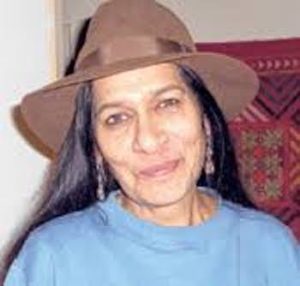
Mala Sen
*Mala Sen was born on this date in 1947. She was a Bengali Indian-British writer and human rights activist.
Born in Mussoorie, Uttarakhand, Mala Sen was the daughter of Lt. Gen. Lionel Proteep Sen and Kalyani Gupta. Following her parents' divorce in 1953, her father raised her. Sen was of Bengali heritage. After attending Welham Girls' School in Dehradun, she studied home sciences at Nirmala Niketan College in Mumbai. In 1965, she eloped to England with Farrukh Dhondy, who had won a scholarship to Cambridge University. They married in 1968 but divorced in 1976, although they maintained a friendly relationship.
After arriving in England, Sen began working as a seamstress to help support her family. Increasingly interested in race relations, she fought for the rights of Indian factory workers in Leicester. Writing in the journal Race Today, she reported how Bangladeshis in the East End of London worked in sweatshops while living in dormitories where shift workers shared beds around the clock. Separated from their East Indian families, they did not qualify for housing accommodations as they were listed as single.
Sen founded the Bengali Housing Action Group with her husband and other activists, which established Brick Lane as a safe living area for the Bangladeshi community in East London. Along with Dhondy, Sen was also an active member of the British Black Panthers movement. She was an early member of the Race Today Collective. Her writing is included in Here to Stay, Here to Fight – A Race Today Anthology (Pluto Press, 2019), edited by Paul Field, Robin Bunce, Leila Hassan, and Margaret Peacock, which features contributions to the journal between 1973 and 1988.
Because of her effective involvement, Sen was invited to research television documentaries. While in India, she became particularly interested in press reports about a lower caste, a poverty-stricken woman called Phoolan Devi, who had suffered forced marriage at 11, gang rape, and kidnapping. While investigating the background of Devi's life, Sen researched the general victimization of women in rural India, where they frequently undergo such pressures that they consider themselves worthless. As a result, she published her second book, Death by Fire: Sati, Dowry Death and Female Infanticide in Modern India, in 2001.
Mala Sen, known for her civil rights activism and work on race relations in London, as well as her book India's Bandit Queen: The True Story of Phoolan Devi, died on May 21, 2011, at the age of 63. She died at the Tata Memorial Hospital in Mumbai after undergoing an operation for oesophageal cancer, which had been diagnosed earlier that year; at the time, she had been working on a new book about women with HIV in India. A memorial event for her was held in London at the Nehru Centre in July 2011.